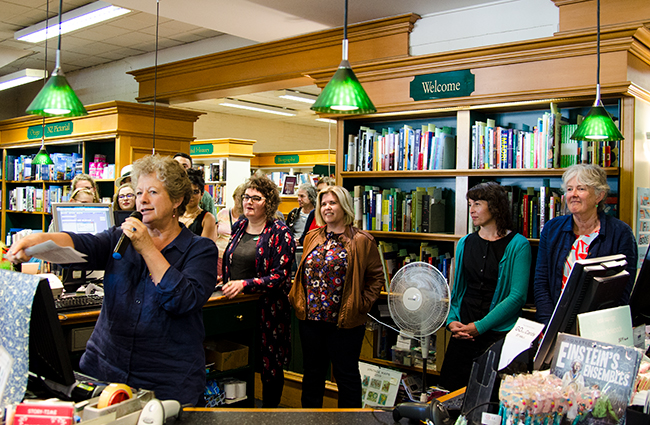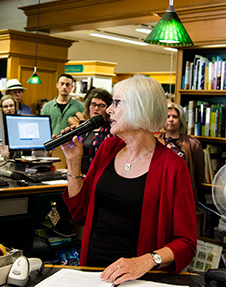Friday 22 February 2019 4:27pm

Otago University Press Publisher Rachel Scott introduces Past Caring; Women, Work and Emotion at the University Book Shop on 21 February.
A new book edited by History faculty staff Professor Barbara Brookes, Associate Professor Angela Wanhalla and lecturer Dr Jane McCabe - Past Caring? Women, Work and Emotion - was launched at the University Book Shop, Dunedin, on 21 February.
Otago University Press Publisher Rachel Scott said by discussing women's involvement in caring in the 20th century, contributing scholars had "vividly connected us to the experiences" of successive generations of New Zealand women.
University of Canterbury Adjunct Associate Professor (Sociology) Rosemary du Plessis introduced the book and commended the work as the type of social history which was needed to "critique the inequity of caring".
Professor Brookes says the book was aimed at examining questions around care which historical and philosophical enquiry have largely ignored.

Adjunct Associate Professor Rosemary du Plessis
What is Past Caring? about?
The book is a collection of essays that examine the history of caring in New Zealand from a variety of angles: from arguments by two New Zealand women philosophers about gender and caring to the depiction of single mothers on screen and how filmic representations of caring disrupt the New Zealand ‘man alone’ myth.
The eleven essays canvass different traditions of caring, as in Melissa Matutina Williams’ essay on ‘Whānau, whenua and care’ , Jane McCabe’s essay on the concept of ayah care and Rosemary Anderson’s essay on the demands of care on a Rarotongan leader, Takau Rio Love.
From feeding the family, explored by Katie Cooper, attending to family memories through album making (examined by Antje Lubcke), the examination of the New Zealand women left raising the children of American servicemen by Angela Wanhalla to the professionalisation of caring examined by Margaret Tennant, the book presents insights into the complexities of care.
What does the book tell us about societal change in relation to work and caring?
The essays suggest the absolute centrality and necessity of care yet how difficult it is to have care recognised and rewarded, in part because of the feminisation of care work. As women have moved into full-time work the time available for caring has reduced, leading to new calls for work-life balance.
You should read this book if you are interested in . . .
The history of New Zealand, the history of women, in the issues surrounding caring and work.
Click here for book details (and the Otago University Press page).